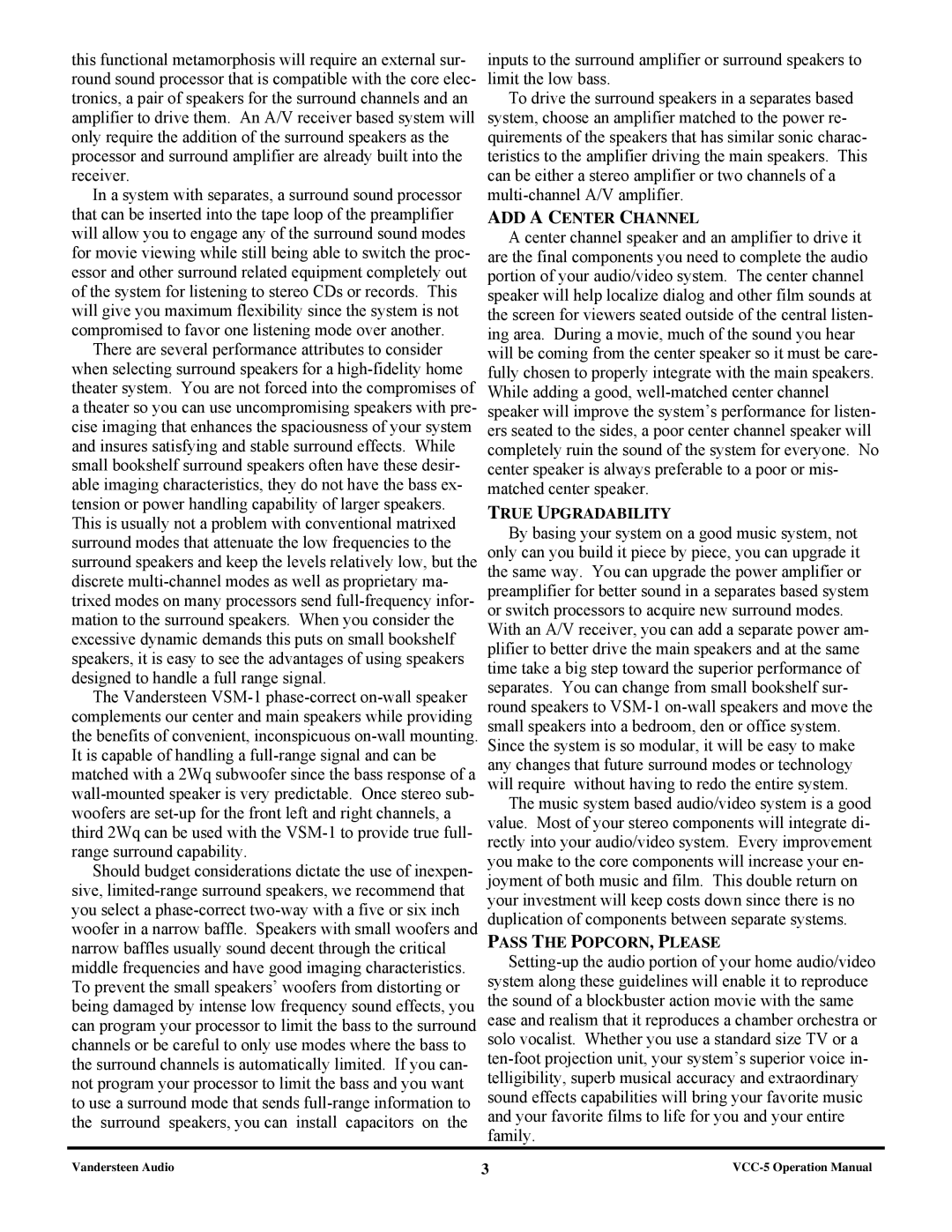this functional metamorphosis will require an external sur- round sound processor that is compatible with the core elec- tronics, a pair of speakers for the surround channels and an amplifier to drive them. An A/V receiver based system will only require the addition of the surround speakers as the processor and surround amplifier are already built into the receiver.
In a system with separates, a surround sound processor that can be inserted into the tape loop of the preamplifier will allow you to engage any of the surround sound modes for movie viewing while still being able to switch the proc- essor and other surround related equipment completely out of the system for listening to stereo CDs or records. This will give you maximum flexibility since the system is not compromised to favor one listening mode over another.
There are several performance attributes to consider
when selecting surround speakers for a high-fidelity home theater system. You are not forced into the compromises of a theater so you can use uncompromising speakers with pre- cise imaging that enhances the spaciousness of your system and insures satisfying and stable surround effects. While small bookshelf surround speakers often have these desir- able imaging characteristics, they do not have the bass ex- tension or power handling capability of larger speakers. This is usually not a problem with conventional matrixed surround modes that attenuate the low frequencies to the surround speakers and keep the levels relatively low, but the discrete multi-channel modes as well as proprietary ma- trixed modes on many processors send full-frequency infor- mation to the surround speakers. When you consider the excessive dynamic demands this puts on small bookshelf speakers, it is easy to see the advantages of using speakers designed to handle a full range signal.
The Vandersteen VSM-1 phase-correct on-wall speaker complements our center and main speakers while providing the benefits of convenient, inconspicuous on-wall mounting. It is capable of handling a full-range signal and can be matched with a 2Wq subwoofer since the bass response of a wall-mounted speaker is very predictable. Once stereo sub- woofers are set-up for the front left and right channels, a third 2Wq can be used with the VSM-1 to provide true full- range surround capability.
Should budget considerations dictate the use of inexpen- sive, limited-range surround speakers, we recommend that you select a phase-correct two-way with a five or six inch woofer in a narrow baffle. Speakers with small woofers and narrow baffles usually sound decent through the critical middle frequencies and have good imaging characteristics. To prevent the small speakers’ woofers from distorting or being damaged by intense low frequency sound effects, you can program your processor to limit the bass to the surround channels or be careful to only use modes where the bass to the surround channels is automatically limited. If you can- not program your processor to limit the bass and you want to use a surround mode that sends full-range information to the surround speakers, you can install capacitors on the
inputs to the surround amplifier or surround speakers to limit the low bass.
To drive the surround speakers in a separates based system, choose an amplifier matched to the power re- quirements of the speakers that has similar sonic charac- teristics to the amplifier driving the main speakers. This can be either a stereo amplifier or two channels of a multi-channel A/V amplifier.
ADD A CENTER CHANNEL
A center channel speaker and an amplifier to drive it are the final components you need to complete the audio portion of your audio/video system. The center channel speaker will help localize dialog and other film sounds at the screen for viewers seated outside of the central listen- ing area. During a movie, much of the sound you hear will be coming from the center speaker so it must be care- fully chosen to properly integrate with the main speakers. While adding a good, well-matched center channel speaker will improve the system’s performance for listen- ers seated to the sides, a poor center channel speaker will completely ruin the sound of the system for everyone. No center speaker is always preferable to a poor or mis- matched center speaker.
TRUE UPGRADABILITY
By basing your system on a good music system, not only can you build it piece by piece, you can upgrade it the same way. You can upgrade the power amplifier or preamplifier for better sound in a separates based system or switch processors to acquire new surround modes.
With an A/V receiver, you can add a separate power am- plifier to better drive the main speakers and at the same time take a big step toward the superior performance of separates. You can change from small bookshelf sur- round speakers to VSM-1 on-wall speakers and move the small speakers into a bedroom, den or office system. Since the system is so modular, it will be easy to make any changes that future surround modes or technology will require without having to redo the entire system.
The music system based audio/video system is a good value. Most of your stereo components will integrate di- rectly into your audio/video system. Every improvement you make to the core components will increase your en- joyment of both music and film. This double return on your investment will keep costs down since there is no duplication of components between separate systems.
PASS THE POPCORN, PLEASE
Setting-up the audio portion of your home audio/video system along these guidelines will enable it to reproduce the sound of a blockbuster action movie with the same ease and realism that it reproduces a chamber orchestra or solo vocalist. Whether you use a standard size TV or a ten-foot projection unit, your system’s superior voice in- telligibility, superb musical accuracy and extraordinary sound effects capabilities will bring your favorite music and your favorite films to life for you and your entire family.
